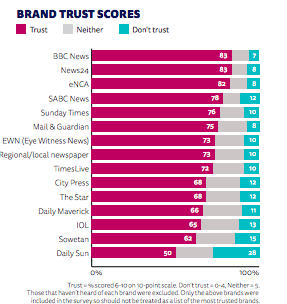The bad news headlines may be true but the good news is often overlooked
Print news has been declining for some time, but the Covid-19 pandemic has accelerated its demise over the past year.
This is according to the Reuters Digital News Report 2021, which has declared that because of restrictions on movement, as well as the hit to advertising revenue, publications have had to adapt and alter their business models to cater more to digital memberships and subscriptions.
The result is that more quality journalism is ending up behind paywalls so publications can reduce their reliance on advertising revenue.
However, progress on this remains slow. The report shows that countries have been pushing digital subscriptions since 2016, and that 17% of people have paid for news online over the past year. This represents a 5% increase since 2016, but the vast majority of consumers continue to resist paying for any online news.
 Print news has been declining for some time, but the Covid-19 pandemic has accelerated its demise over the past year.
Print news has been declining for some time, but the Covid-19 pandemic has accelerated its demise over the past year.
South Africa
South Africa has followed the worldwide trend of declining print sales over the past year. According to the report, circulations of daily papers are down by 40% and print as a news source has fallen to 32% — down five percentage points from 2020.
The report explains that this may mean more print titles shutting down in the near future.
However, it is not all doom and gloom for publications. The report says that some have built sustainable business models that are more subscriber-based, such as Netwerk 24 and Daily Maverick.
Another optimistic example for newsrooms across the country is the fact that the country’s leading news site, News24, which launched its paywall in August 2020, racked up 20 000 subscribers in just two months.
Positivity can also be taken from Daily Maverick, which in a “bold move”, launched its DM168 print edition. That publication has claimed a circulation of 31 000 copies a week for the seven weeks leading up to the end of March.
The report says that the success of the paper can be directly attributed to the online reach of the Daily Maverick, which increased from 11% to 19% in the past year.
The report also highlights that most mainstream publications in South Africa have maintained more than 60% trust from the surveyed population.
The Mail & Guardian is placed as the fifth-most trusted local publication and the second most trusted weekly publication. The survey found that the M&G is trusted by 76% of people.
It ranks just eight points behind News24, according to the report.
And despite the adversity that the M&G faced at the beginning of the pandemic, it has also managed to maintain a spot in the top 15 news brands in South Africa for both offline and online reach.
 Reuters Institute Digital News Report 2021
Reuters Institute Digital News Report 2021
The outstanding mover in the survey is eNCA, which saw its trust score increase from 78% to 83%, while its television reach went up by 18 percentage points, pushing it to 58%. This jump has allowed eNCA to surpass the SABC as the most accessed offline news brand in South Africa.
It should be noted that the SABC cut more than 600 jobs in March, which has negatively affected the state broadcaster.
While newsrooms in South Africa grapple with the effects of the pandemic and the decline of print, misinformation remains prominent, especially in Africa compared to other regions.
The report notes that the use of social media for news remains strong, particularly among younger people and those with lower levels of education. Messaging apps like WhatsApp and Telegram have become especially popular in the Global South, creating the most concern when it comes to spreading misinformation about the coronavirus.
Facebook and WhatsApp are two of the most-used apps in South Africa and there have been calls from politicians to talk to Facebook about ways to stop the spread of misinformation on its platforms. Facebook owns both WhatsApp and Instagram.
The government made it a criminal offence to spread fake news about the coronavirus last year under the disaster regulations and also asked companies to remove any misinformation spread on platforms.
 Reuters Institute Digital News Report 2021
Reuters Institute Digital News Report 2021
International
Digital models have been successful in a number of wealthy countries in which there has been a history of high levels of print newspaper subscriptions, such as Norway, Sweden and The Netherlands. These countries have all experienced three-percentage-point increases in paid digital consumers over the past year; meanwhile, at least 21% of consumers pay for at least one news outlet in the US.
However, the situation in the majority of countries remains bleak. Nine percent of people say that they pay for digital news in Germany, while just 8% in the UK do so.
 Reuters Institute Digital News Report 2021
Reuters Institute Digital News Report 2021
Although the pandemic has certainly complicated the way newsrooms operate, the report says that trust in the news has grown in the past year, showing a six percentage point increase over the past year.
Finland remains the country with the highest levels of trust in the news, with 65% of people responding positively, whereas the US now has the lowest levels of trust, at 29%.
The report found that mistrust occurred in countries in which Covid-19 had not been the biggest item on the agenda, or where other social or political issues had played a bigger role. For example, the US presidential election caused many people to turn away from the news, especially right-wingers, who lost interest after President Joe Biden was elected.